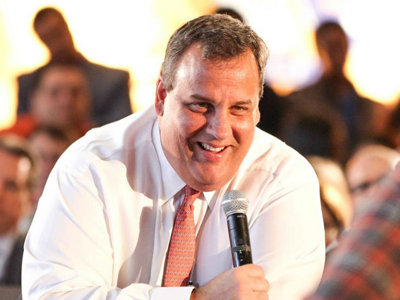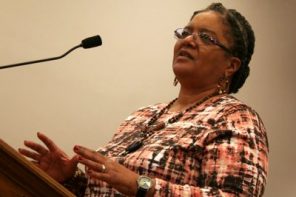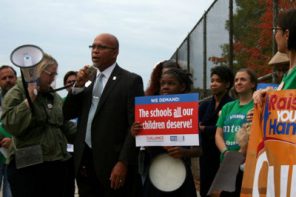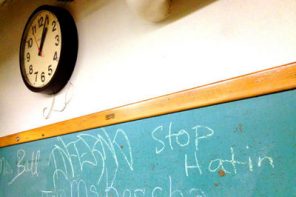Saying a Republican is against unions, especially public sector unions, is kind of like saying the sky is blue or water is wet. It’s not a surprise, and by now, it’s a sad cliche.
But last week, New Jersey Gov. Chris Christie – struggling to get traction in a GOP primary dominated so far by political outsiders and monsters – said that teachers unions were “the single most destructive force [in] public education in this country.”
It’s tempting to ignore this demagoguery – Christie seems unlikely to win the nomination given current polling, and I am unlikely to change the mind of anyone reading this, whether they agree with Christie or not – but I won’t.
It’s also tempting to send in a two-word column in response to his comments, but this is a family website.
So instead, let me get into this a little to explain some of how I know Christie is wrong, and to talk a bit about what might really be destructive in public schools right now.
I know I have been through much of this before, most recently last year when suburban legislators proposed and pushed through a plan to remove control of some schools from the elected school board in the city of Milwaukee. The authors were not coy about their disdain for unions, writing into law that teachers in the schools of this so-called Opportunity Schools Partnership Plan were prohibited from joining a union, any union. One of the primary authors told his conservative media allies that the plan was designed to liberate schools from under the thumb of “the unions.”
They can’t answer the question how it’s possible for the best schools in the state to be staffed with union teachers and haven’t expressed an interest in attacking the unions in schools within their district borders. They can’t explain why they have no similar plan for the non-union private schools that are failing Milwaukee’s students at the same rate or faster than the unionized public schools.
But Christie goes beyond the standard GOP position that unions are merely bad to make a much bolder claim: that the presence of unionized teachers is, again, “the single most destructive force [in] public education in this country.”
To defend his point, Christie explained that teachers unions in New Jersey – get this, you will be amazed – collect dues from their members. That’s why Christie’s bumper stickers really ought to read “Master of the Obvious 2016.”
Moreover, he said, the unions “pay nothing toward teacher salary, teacher pension or teachers’ healthcare.” This may have to do with how the teachers unions are not actually the employers of those teachers. Indeed, the dues come out of the teachers’ salaries, so using the dues to pay salaries would be, oh man, I can’t even think of a way to complete that sentence because the argument is so dumb. Come on, Christie.
What he misses is that the unions do provide valuable support and professional development for their members, funded by dues. They provide grants to schools and districts to pursue innovations and new ideas – including, for example, a recent National Education Association grant to Milwaukee to expand its aquaponics and urban farming programs.
The dues seemed to be Christie’s best evidence, though, since he called the total union dues collected in New Jersey “a $140 million political slush fund to be able to reward their friends and punish their enemies.” This is very different, I am sure, than, say, the heir to the Busch beer fortune, whose money is intended only to reward the fully meritorious, like Chris Christie.
That’s not evidence of destruction in schools, though. Fact is, he’d be hard pressed to offer evidence of actual destruction of the US public schools system as a whole. As I noted late last year, our students’ scores on the NAEP test (“the nation’s report card”) have held steady or gone up in recent years, holding at all-time highs. Our nation’s graduation and college matriculation rates are at historic highs. All of this while teachers unions have, though under attack, maintained relative strength compared to the overall rate of unionization in the private sector.
Are there problem areas? Absolutely – the nation’s poor and minority children are still lagging their rich and white peers, though this generation will have a considerably smaller gap than that of Christie’s generation for sure. And the perception of school quality remains an issue, with polls consistently showing that even if parents think their own children’s schools are doing fine, they believe the system as a whole is terrible.
There is a long history behind that, and we don’t need to go all the way back to 1983’s “A Nation At Risk” again today. But as Christie demonstrated last week – and as Wisconsin’s Republicans have demonstrated over the last five years – there is no downside for a politician on the right to attack public schools and demagogue against the teachers and their unions.
The downside is instead for schools and students, and it comes from what I believe is the real “single most destructive force in public education” today: the right-wing anti-government, anti-tax resistance to funding public schools at the level they need.
Earlier this month, the Center for Budget and Policy Priorities released a new report comparing spending in fiscal year 2014 to spending in 2008, before the Great Recession hit. It makes sense that the recession caused some cutbacks, but the report notes that in 2014, five years into recovery mode, most states had not returned spending to pre-recession levels, and the total national funding for all states was lower in 2014. Even in the preliminary budget data for the current school year, the report says, at least half of all states are still below pre-recession levels in terms of funding their schools.
Guess what political party is running most of those states, including most of those with the biggest cuts since 2008 – Oklahoma, Alabama, Arizona, Wisconsin – long past the point of recovery? Hint: Chris Christie wants to be their king.
We can bicker back and forth over whether school funding is really what promotes student excellence, but at the very least, I think we can all agree that less is probably not really helping students more. Just one data point to think about: CPBB notes that schools have cut nearly 300,000 teaching positions across the country while student enrollment has grown by more than 800,000.
Here in Wisconsin, schools are getting a triple whammy. Not only is funding for schools still below pre-recession levels (by nearly $500 per student between 2008 and 2014 in 2014 dollars, according to state data), schools are being hit by the expansion of the state voucher program and will probably get kneecapped by a proposed law limiting how often and when they can go to referendum to make up the funding shortfalls from the state.
In other words, we ought to be thanking our teachers and celebrating our schools for being able to keep up performance so well over the last few years in spite of the devastating cuts in funding. How long can we keep it up? How long can states like ours, with cuts to funding, keep up with states like Minnesota or Vermont that have boosted funding in recent years?
Christie, after knocking unions, went on to say that schools need more changes than just breaking the unions, including new technology that can help kids learn at their own pace and help teachers more easily personalize learning. “Every kid should just be carrying an iPad,” he said. “They’re more comfortable working on that stuff than they are lugging those books around.”
Look, here I am in agreement with the man. I’ve said as much in this space in the past. But guess what? All that takes money. Just imagine what it would take to give every kid an iPad (or Chromebook or Surface or whatnot). Not only are you investing in the technology, you need training for teachers and students, Wi-Fi infrastructure in schools and significantly boosted broadband infrastructure within districts, and licenses for the electronic versions of textbooks (publishers won’t start giving away their content just because it’s pixels instead of pages).
So let’s get this straight, shall we? Unless you’re a demagogue like Christie, the actual evidence is pretty strong that unionized teachers are not a threat to school achievement, and real school budgets have been devastated since the recession by the reactionaries in Christie’s party that would rather cut property taxes by a few dollars per homeowner than invest in our children.
With luck and hard work, 2016 will not see Christie’s demagoguery prevail. He will not be anyone’s king. Then we just have to work on funding schools again.


 i evaluate to yes even if there's no image
i evaluate to yes even if there's no image  i evaluate to yes even if there's no image
i evaluate to yes even if there's no image  i evaluate to yes even if there's no image
i evaluate to yes even if there's no image  i evaluate to yes even if there's no image
i evaluate to yes even if there's no image  i evaluate to yes even if there's no image
i evaluate to yes even if there's no image  i evaluate to yes even if there's no image
i evaluate to yes even if there's no image 